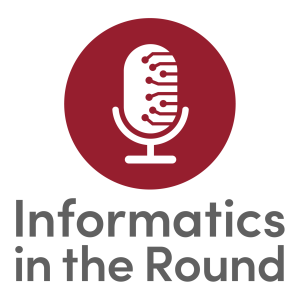
This episode of Informatics in the Round includes a number of fantastic guests.
Josh Peterson (heard first after my introduction to the episode, but not formally introduced in the audio) is an internist, a brilliant informatician, and an expert in precision medicine here. Josh received his M.D. through the Vanderbilt University School of Medicine in 1997. He completed an Internal Medicine residency at Duke University Medical Center, a fellowship in General Internal Medicine at the Brigham and Women’s Hospital, and a Masters of Public Health degree at the Harvard School of Public Health. Josh is known internationally for his work in precision medicine He has been coordinating a set of national responses to the disease, through his as well as spending time on the front line of care.
Melissa McPheeters is an expert in epidemiology, health policy, and informatics at Vanderbilt. She received her PhD in Epidemiology at the University of North Carolina at Chapel Hill in 2003. She was on faculty here for 10 years as director of the Vanderbilt Evidence-based Practice Center, before taking on the tough role as the Director of the Office of Informatics and Analytics at the Tennessee Department of Health, and Principal Investigator on three federally funded grants to address the opioid epidemic, each with a strong focus on analytics.
It’s a pleasure to have Shannon Rich back, and on hand to keep it real. Shannon is a lot of things: Insightful, unafraid, and so quick-witted. But it was hard to be witty in a room this topic, which literally has changed the course of how we live and think.
Charles K Brown. Singer, Songwriter, and friend of mine. Charlie Brown (yes, that’s his name) is the first person I knew whose birthday was April 1st. I remember asking him if his parents named him Charlie Brown as an April Fools day joke. He didn’t answer. But he does speak volumes with his songwriting here in town and around the country. He’s on youtube, and I hope you take a listen to his work there.
Charlie and Shannon listened and asked a lot of questions, but it was clear that there was one central issue on both of their minds, so we went there. We covered relatively little about the range of ways informatics is involved in collecting data, sharing it for prediction and research projects, and also making changes to electronic health records to support the rapid dissemination of knowledge to the nurses and physicians caring for these patients. But trust me, all that is happening around the world right now. Instead, we focused on a couple of other things, and as always, I want the conversation to be one that is led by our non-informatics guests, so that’s where we went. I think it will resonate well with a lot of you, and give those of you who are fellow informaticians some practical and useful ideas for work we need to do better.
This was a really important episode to record. I hope you agree.
No comments yet. Be the first to say something!